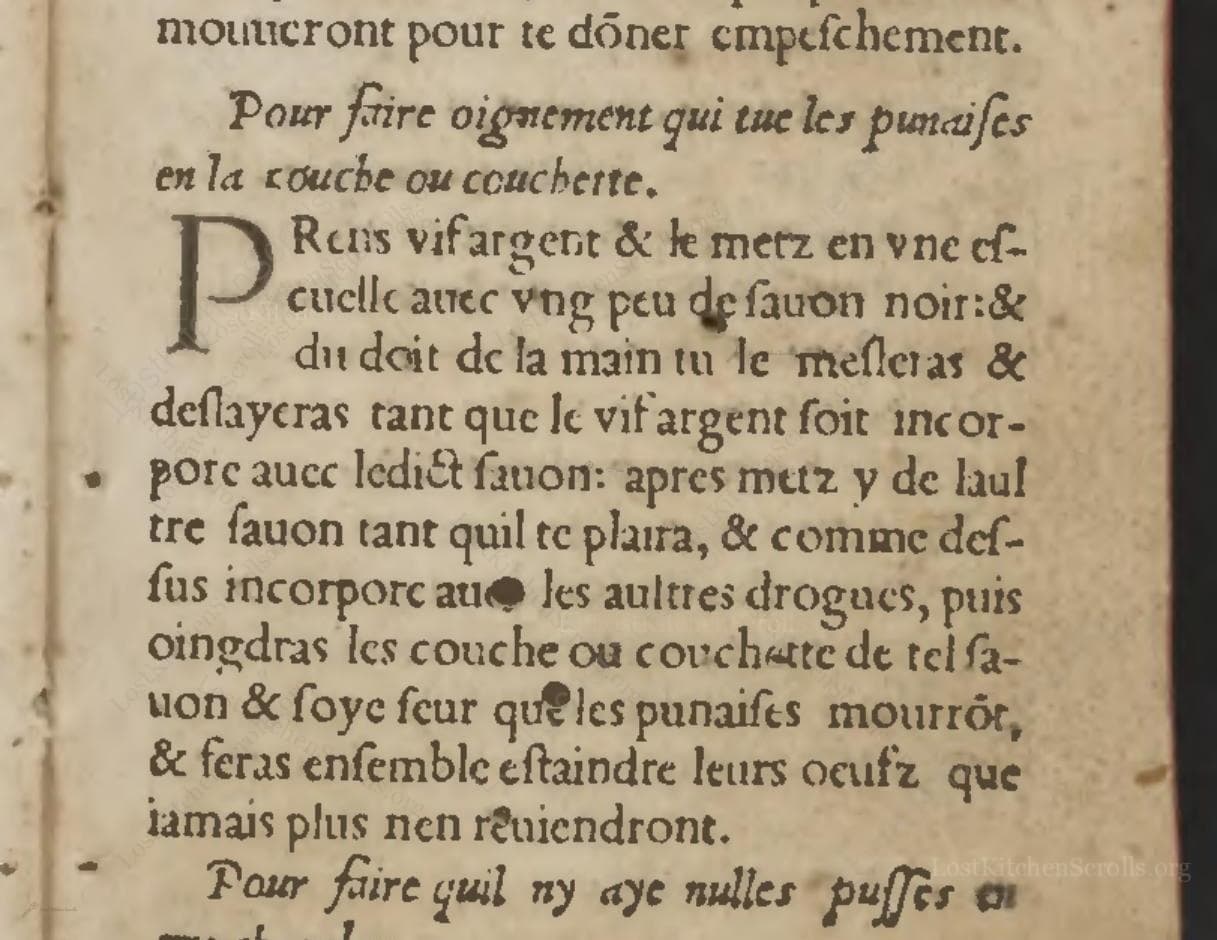Pour Faire Oignement Qui Tue Les Punaises En La Couche Ou Couchette
"To Make An Ointment That Kills Bedbugs In The Bed Or Bedding"
From the treasured pages of Bastiment de receptes
Unknown Author

Pour Faire Oignement Qui Tue Les Punaises En La Couche Ou Couchette
"Prens vif argent & le metz en vne escuelle auec vng peu de savon noir: & du doit de la main tu le mesleras & deslayeras tant que le vif argent soit incorpore auec ledict savon: apres metz y de laul tre savon tant quil te plaira, & comme dessus incorpore au les aultres drogues, puis oingdras les couche ou couchette de tel fauon & soye seur que les punaises mourrõt, & feras ensemble estaindre leurs oeufz que iamais plus nen reuiendront."
English Translation
"Take mercury and put it in a bowl with a little black soap, and with your finger mix and dissolve it until the mercury is incorporated with the soap. Afterwards, add more soap as much as you want, and as above incorporate the other ingredients. Then, anoint the bed or bedding in this manner, and be assured that the bedbugs will die, and you will also destroy their eggs so that they will never return."
Note on the Original Text
This recipe is written in the direct, instructional style of 16th-century kitchen manuals, using imperative verbs and a conversational tone. Spelling is phonetic and reflects the regional French of the time—for example, 'oignement' for ointment, 'couche ou couchette' for bed or bedding, and 'vif argent' for quicksilver (mercury). Numbers and measurements are imprecise ('a little', 'as much as you like'), as was standard—household experience, rather than standardized measures, governed the preparation of such remedies.

Title
Bastiment de receptes (1541)
You can also click the book image above to peruse the original tome
Writer
Unknown
Era
1541
Publisher
A Lescu de Coloigne
Background
Step into the culinary secrets of Renaissance France! 'Bastiment de receptes' is a delectable compendium newly translated from Italian, brimming with recipes, curious odors, and medicinal tidbits designed to both delight the palate and preserve health.
Kindly made available by
Library of Congress
This recipe is from 'Bastiment de receptes', a fascinating 16th-century French household manual translated from Italian and printed in Lyon in 1541. These practical books were treasured by early modern households for their wide array of remedies, perfumes, and domestic secrets, blending the boundaries of medicine, craft, and daily life. The recipe itself shows the kind of ingenuity and experimentation used in early household pest control practices. Dangerous ingredients like mercury were commonly used, reflecting the ongoing trial-and-error approach to domestic science before the advent of modern chemistry and toxicology.

The original recipe would have been prepared using a simple earthenware or ceramic bowl for mixing, and the cook or housekeeper would use their finger for blending the ingredients—a tactile and direct approach. Application was just as straightforward: a piece of cloth or simply the fingers would be used to rub the ointment on beds and bedding, as careful precision was less of a concern than effectiveness.
Prep Time
5 mins
Cook Time
0 mins
Servings
1
We've done our best to adapt this historical recipe for modern kitchens, but some details may still need refinement. We warmly welcome feedback from fellow cooks and culinary historians — your insights support the entire community!
Ingredients
- 0.35 ounces elemental mercury (quicksilver) (NOTE: Toxic, do not use today)
- 0.35–1.05 ounces black soap (substitute: soft soap or unscented liquid castile soap)
Instructions
- To make an ointment that kills bedbugs in the bed or bedding: Take about 0.35 ounces of mercury (quicksilver) and place it in a small bowl.
- Add a small piece (about 0.35 ounces) of black soap (you may substitute soft soap or liquid castile soap if needed).
- Using your finger, thoroughly mix and blend the mercury with the soap until the mercury is fully incorporated.
- Then, add more soap as desired (up to an additional 0.7 ounces), mixing well so everything is homogeneous.
- Once the ointment is ready, use it to rub down the surfaces of beds and bedding where bedbugs dwell.
- According to the original text, this ointment will kill the bugs and destroy their eggs, preventing their return.
Cooking Estimates
Mixing soap and mercury by hand takes just a few minutes. There is no actual cooking, only blending the ingredients until smooth and well mixed. The ointment makes enough for 1 application to a standard bed.
As noted above, we have made our best effort to translate and adapt this historical recipe for modern kitchens, taking into account ingredients nowadays, cooking techniques, measurements, and so on. However, historical recipes often contain assumptions that require interpretation.
We'd love for anyone to help improve these adaptations. Community contributions are highly welcome. If you have suggestions, corrections, or cooking tips based on your experience with this recipe, please share them below.
Join the Discussion
Rate This Recipe

Den Bockfisch In Einer Fleisch Suppen Zu Kochen
This recipe hails from a German manuscript cookbook compiled in 1696, a time whe...

Die Grieß Nudlen Zumachen
This recipe comes from a rather mysterious manuscript cookbook, penned anonymous...

Ein Boudain
This recipe comes from an anonymous German-language manuscript cookbook from 169...

Ein Gesaltzen Citroni
This recipe, dating from 1696, comes from an extensive anonymous German cookbook...
Browse our complete collection of time-honored recipes



